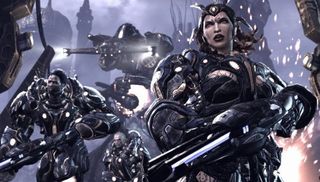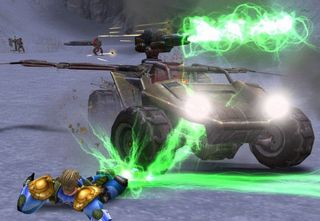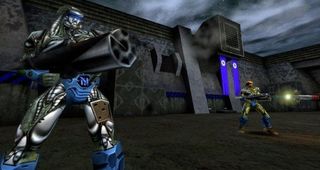
Epic recently announced that they're making a new free Unreal Tournament game in collaboration with the UT community. This is good news. We like Unreal Tournament. Only yesterday, Andy wrote about his love for Facing Worlds . The monstrous flak cannon took the top spot in our roundup of gaming's greatest guns . With misty-eyed memories of frags gone by, we fired over some questions to Steve Polge, senior programmer and project lead on the new Unreal Tournament, to find out how this community collaboration thing will work.
PC Gamer: Why did you decide to go with a community-driven development model?
Steve Polge: We wanted to bring back Unreal Tournament in collaboration with our passionate fans and mod community. Community-created content and mods have always played a huge part in the appeal and success of the Unreal Tournament series. With Unreal Engine 4 now available to everyone, we see a unique opportunity to re-invent the competitive FPS.
PC Gamer: Can you give an example of how Epic's team will collaborate with the community when building the game?
Steve Polge: We will have a very open and inclusive process for establishing how the core of Unreal Tournament evolves. We'll build consensus and make sure the community buys into the direction we establish together. Design questions will be discussed on the forum and in regular Twitch streams, and the decision process will be inclusive and transparent. Players will be able to make their voice heard, and participate meaningfully in setting the direction of development. We will release playable alpha versions and use those to get hands-on feedback from players as well. Epic realizes that we are ultimately responsible for making sure that the core game is awesome and we'll get there with the contributions of our community.
PC Gamer: Would you ever veto a community decision that you don't think fits in a UT game?
Steve Polge: It isn't a matter of Epic overruling community decisions—we'll be an integral part of the process that produces those decisions. A great thing about this development model is that community developers can both participate in the core design process, and at the same time are free to perfectly realize their own creative vision in their mods.
PC Gamer Newsletter
Sign up to get the best content of the week, and great gaming deals, as picked by the editors.
PC Gamer: How do you go about balancing an open-source, community driven competitive shooter?
Steve Polge: I believe this development model gives us the opportunity to build a much better balanced and finely tuned game, which is vital to the long-term success of a competitive shooter. It's already evident that there are many players contributing to our design discussions that have a thorough understanding of game mechanics and balance issues. Their contributions will help make Unreal Tournament's gameplay deeper and more balanced than any past title. In addition, having a large audience of developers and fans continuously playtesting the game and providing feedback will have a massive impact on our ability to make sure all elements of the game are well-balanced for a wide range of skill levels.

PC Gamer: Are you taking inspiration from earlier arena-based UTs, or Unreal Tournament 3's larger-scale-with-vehicles approach?
Steve Polge: We are focusing first on implementing a polished and updated version of the arena Deathmatch and team game modes. After that, we'd love to work with our community to bring the vehicle-based combat of UT2004 and UT3 to the new Unreal Tournament.
PC Gamer: How do you think a free old-school UT game will fit into the modern shooter climate?
Steve Polge: Unreal Tournament still has a lot of passionate fans. We think there is a desire and a place in today's PC FPS community for a modern competitive shooter that brings back the kind of pure, fast action, skill-based gameplay for which the series is known.
PC Gamer: What do you think of the way modern shooters have moved away from community-driven content and dedicated servers, toward prescribed services driven by expansion packs?
Steve Polge: We think that our community-driven model is something gamers want and will love, and we're excited to bring it back for all our fans who already appreciated it, and to introduce it to a new generation of gamers.
PC Gamer: Do you see UT mod development as a gateway from amateur development towards larger projects using the now cheaper Unreal Engine subscription model?
Steve Polge: Epic's roots are as a small independent game developer, and introducing game development to aspiring designers, artists, and programmers has always been part of our DNA.
From the adventure creation capabilities of ZZT back in 1991 to the release of the Unreal Editor tools along with the first Unreal game in 1998, to making Unreal Engine 4 widely available this year, we have always wanted to inspire and support new generations of students, hobbyists, modders and small teams to make their games a reality.
We focused on making Unreal Engine 4 much easier to use with designer-friendly features like Blueprints. Building Unreal Tournament in close collaboration with UE4 developers and fans feels like the next logical step towards breaking down the remaining barriers to getting more and more people making great games.

PC Gamer: What are the favourite UT maps at Epic? Which guns are popular on the team?
Steve Polge: That's a tough question with maps especially, since there are so many great maps to choose from. Historically, the maps we shipped with our demos were generally the ones we thought at the time were both really fun and broadly appealing. When I polled guys around the office, we ended up with a huge list. Just sticking with official maps from UT99 our list includes for Deathmatch or TDM: Deck16, Phobos, Tempest, Curse, and for CTF: Coret, November, FacingWorlds, and Lavagiant.
My personal favorite weapon is the Shock Rifle. When I polled guys around the office, the Flak Cannon and Rocket Launcher were often mentioned, along with some love (and some hate) for the Bio Rifle. We also have several Sniper fans (*cough* campers *cough*). And the Impact Hammer and Translocator got some votes.
PC Gamer: Are you looking to encourage an esports community around the new UT? Will there be spectator tools etc?
Steve Polge: In the near term, aspiring to be a competitive FPS means making sure we have balanced gameplay mechanics that reward a variety of play styles so that success is primarily determined by skill. Longer term, we'd love to support UT as an eSport game, and we'll need the community's help in designing and implementing many of the features that implies, like advanced match spectating, broadcasting and livestreaming.
Hey folks, beloved mascot Coconut Monkey here representing the collective PC Gamer editorial team, who worked together to write this article! PC Gamer is the global authority on PC games—starting in 1993 with the magazine, and then in 2010 with this website you're currently reading. We have writers across the US, UK and Australia, who you can read about here.
Most Popular





